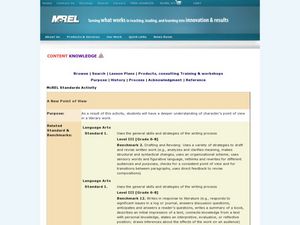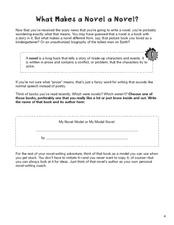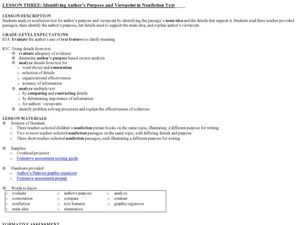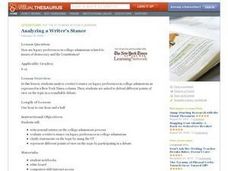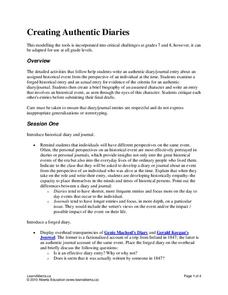K12 Reader
Change the Point of View: First Person and Third Person
How is a story different when told from various points of view? Learn about first and third person points of view with an activity based on Robert Louis Stevenson's Treasure Island. Readers examine a passage written in first person, then...
Curated OER
Third-Person Limited, Omniscient or Objective Point of View?
Help your readers identify different points of view by studying key words the author uses to mold the story. There are four story excerpts provided here, and readers must identify the point of view, record the words that led them to that...
Manchester College
What’s Your Point of View?
Work on deciphering the point of view of various pieces of literature. As readers review the concepts of first, second, and third person perspective, they apply what they know to different passages.
Premier Literacy
Point of View
Incorporate technology into a literature lesson with an innovative language arts lesson. Middle schoolers read an electronic version of original stories or fairy tales, and after determining the point of view, rewrite the tale from a...
Curated OER
A New Point of View
Analyze point of view and how it affects a literary work with this lesson. Middle schoolers create a written piece that focuses on point of view. They review the literary term "point of view," and explore examples of the term in text....
Curated OER
Identifying Different Perspectives - Camilo's Drums
Explore differing points of view with your upper elementary and middle schoolers. Learners watch a video segment called "Ancestors Talk through Drums" and determine what perspectives are presented. Then, using the included worksheet,...
Linda Hoyt and Lynnette Brent Sandvold
Point of View: The Outsiders
Incorporate these ideas for tracking point of view into your lessons for S.E. Hinton's The Outsiders. The resource provides ideas for talking about point of view at various points in the novel and provides a prompt for reflection. Also...
Curated OER
Dear Diary
Work on narrative writing with this lesson, in which middle schoolers analyze the characters from a selected piece of literature and write narrative diary pieces as the character. They work to understand the point of view of the...
National Endowment for the Humanities
Edgar Allan Poe, Ambrose Bierce, and the Unreliable Narrator
Stories by Edgar Allan Poe and Ambrose Bierce provide readers with an opportunity to investigate unreliable narrators. The lesson plan begins with an activity about different types of point of view and continues as scholars apply their...
Curated OER
Of Mice and Men: Viewing Guide
In this Of Mice and Men viewing guide worksheet, students study movie terminology as they read brief descriptions and respond to 26 short answer questions as the watch the film based on Steinbeck's novel.
Curated OER
Historical Agency in History Book Sets (HBS)
Study historical events by combining the study of historical fiction and non-fiction. Learners read about true past events in historical fiction novels and then research non-fiction accounts of the same events. What are some differences...
Curated OER
Nibble, Nibble, Little Mouse
Learners complete activities to analyze points of view in different texts. In this point of view lesson, students read Hansel and Gretel and The Magic Circle and discuss the points of view. Learners choose a character from the story and...
Curated OER
Number the Stars, Lesson 11
Students analyze point of view in the novel Number the Stars. Their writing prompt is how would this chapter(11) be different if Peter were telling the story? Students create a class concept web about pride on the board.
Curated OER
What Makes a Novel a Novel?
As your authors prepare to write a hypothetical novel, they need all the inspiration they can find! Using a book they have already read (and enjoyed), learners complete a literary analysis by filling in eight short-answer questions....
Academy of American Poets
Teaching the Vietnam War with Poetry and Archives
The language of and the perspective of photographs, poems, and official reports differ. After a close reading of two photographs, two poems, and a military report about the Vietnam War, individuals adopt someone's voice or something from...
Curated OER
Reliving History through Slave Narratives
Helpful for an American literature or history unit, this lesson prompts middle schoolers to examine slavery in the United States. They read slave narratives that were part of the Federal Writers' Project and then conduct their own...
Houghton Mifflin Harcourt
El Bronx Remembered
Use a worksheet to cover different types of conflicts from El Bronx Remembered, a series of short stories by Nicholasa Mohr. The questions address "A Very Special Pet," "Shoes for Hector," "Mr. Mendelsohn," "A Lesson in Fortune-Telling,"...
Curated OER
Identifying Author’s Purpose and Viewpoint in Nonfiction Text
Why do people write books? Pupils discover how to identify the author's viewpoint. They read non-fiction passages their instructor selects (the plan has the class look at nonfiction children's picture books), and then identify the...
Novelinks
Words by Heart: Guided Imagery
Sad, depressed, miserable, inconsolable, forlorn: so many synonyms have a lot of variety with their connotations. Through the guided imagery activity, writers explore the use of connotation and its influence on imagery and description by...
Curated OER
Analyzing a Writer's Stance
Should college admissions decisions be based on whether whose family members attended? Secondary students read and respond to a New York Times article on the issue of 'legacy preferences' in college admissions. Following class...
Blake Education
Harry Potter and the Philosopher’s Stone
The motto for Hogwarts School of Witchcraft and Wizardry warns that one should never tickle a sleeping dragon, but learners will definitely be tickled by the activities in a packet of materials designed to accompany a reading of the...
Novelinks
The Devil’s Arithmetic: Concept Analysis
A helpful guide to Jane Yolen's The Devil's Arithmetic for your literature unit. Use the sections on point-of-view, dramatic irony, and background knowledge, among others, to frame your lessons in an engaging and educational way.
Alberta Learning
Creating Authentic Diaries
Napoleon Bonaparte once said, "What is history but a fable agreed upon?" A series of lessons encourages learners to look beyond the basic fable agreed upon related to events in history and consider multiple accounts of the event. The...
Curated OER
Writing Sentences Lesson Plan
Students explore first person and third person points of view. In this perspective instructional activity, students identify first person and third person points of view in literature they have read. Students rewrite stories from...






